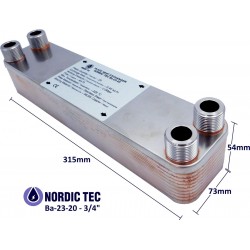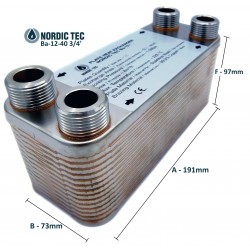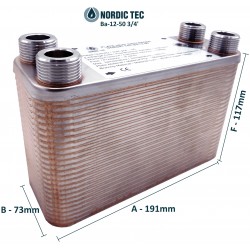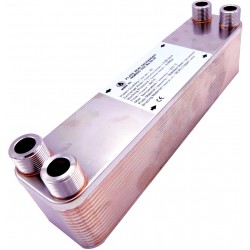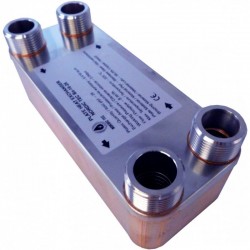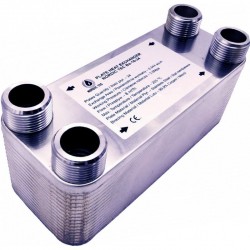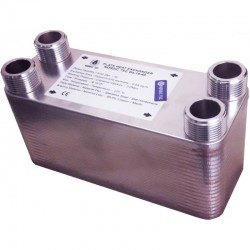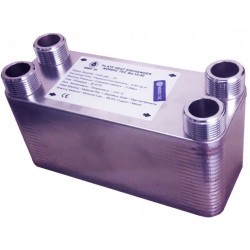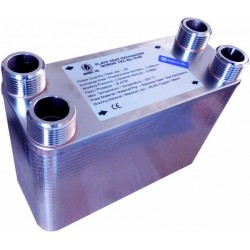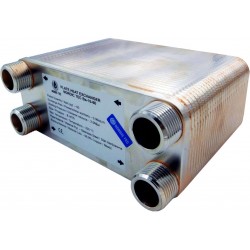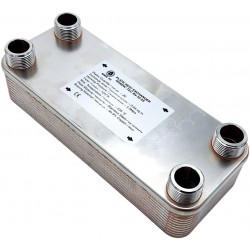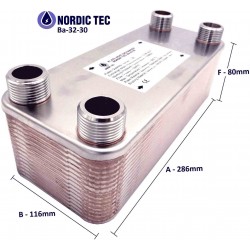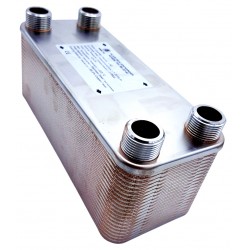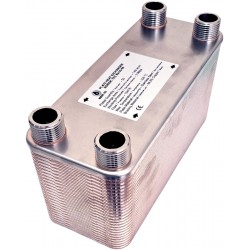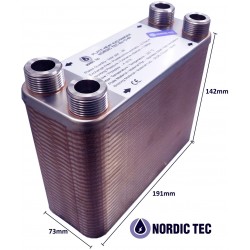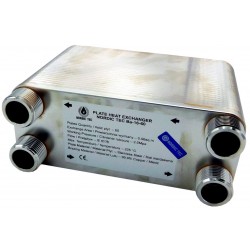Heat Exchangers for electric & electrode boilers
How to choose a plate heat exchanger for connecting an electric or electrode boiler to a central heating system
If there is a need to separate the electric or electrode boiler system from the installation, the selection of the heat exchanger for such devices should be based mainly on the conversion of the heat transfer area of the PHE plates to the heated area, i.e. the area of the building. Our basic recommendation is a minimum of 0.30m² of HE plate area per 100m² of building for old or older installations, and a minimum of 0.25m² of boards per 100m² of building area for relatively new installations. These heat sources are perfectly controllable, so you should not be afraid of overheating the system in the absence of appropriate oversizing - while undersizing the heat exchanger may affect the overestimated power consumption of our boiler.
Under no circumstances should you be guided by the power of electric boilers given in kW, because these are the power of electric heaters and will not be compatible with the nominal power of PHE in the central heating system. However, it is worth remembering about additional factors that must be taken into account, such as the size of connections and possibly additional specificity of the building, e.g. lack of insulation or other types of additional heat losses.
In the case of electrode boilers, it should be remembered that the decision to use a PHE eliminates the possibility of water treatment with salt addition. The use of salt may cause unsealing of the steel plates, i.e. damage to the heat exchanger, which will not be covered by the warranty.
Below we have compiled some popular models that we often sell for electric boilers, although it should be remembered that our other exchangers are also suitable for this, provided that they are properly selected.
Plate Heat Exchanger NORDIC Ba-32-30 1" 175kW
Heat exchangers for electric and electrode boilers
Heating houses and appartments using electrical energy is gaining increasing popularity in the European market. By combining an electric boiler with a photovoltaic installation, we obtain an exceptionally efficient and environmentally friendly heating system with a high level of user comfort.
In some situations , there is a need to separate the electric boiler from the central heating system, for example, when the heating system operates in an open loop configuration. In such cases - the purchase of a plate heat exchanger is necessary, which will separate both circuits while maintaining the maximum utility of the system. In the online store Nordic-sklep.pl, we offer a wide selection of plate heat exchangers for electric and electrode boilers, among which every customer can easily choose a model that suits their needs. We invite you to explore our range of products.
Heat Exchanger Store for Electric Boilers - Nordictec-store.com
Nordictec-store.com is a place where you can find high-quality heat exchangers for electric and electrode boilers. With our offered products, each of our Customers can enjoy comfort and achieved savings, as plate heat exchangers for electric boilers work efficiently and reliably. We offer a wide range of products - our selection includes PHE suitable for both individual users and businesses. Our store guarantees the highest quality and professional assistance in choosing the appropriate heat exchanger model.
Investing in a plate heat exchanger for electric boilers is an investment in boiler protection - that's why we invite you to explore our offerings.
Heat Exchanger for Central Heating: Plate Heat Exchanger for Electric Boilers
Currently for practical reasons, central heating installations are typically designed as closed-loop systems. This means that the central heating circuit is not equipped with an overflow tank, and the working fluid circulates continuously within the closed loop, without coming into contact with atmospheric air. However, sometimes there is a need to connect the heating system with an additional circuit, such as domestic hot water ( DHW ), which operates in an open-loop configuration. For this purpose, plate heat exchangers (PHE) are used. Installed between two circuits, these heat exchangers effectively transfer thermal energy between the two media, preventing them from mixing with each other.
Heat Exchanger separating an Electric Heater or Boiler - Operating Principle
Heat exchange or heat transfer - in a heat exchanger for electric heater boilers follows the principle of transferring thermal energy from a medium with a higher temperature to a medium with a lower temperature. Plate heat exchangers for electric and electrode boilers are constructed from a series of interconnected steel plates, which efficiently transport heat between circuits. If such a heat exchanger is connected to two circuits, its role is to heat the fluid in the circuit with the lower temperature using energy from the medium with the higher temperature. An obvious consequence of the plate heat exchanger's operation is also the cooling of the working medium with the higher temperature . It's easy to notice that a plate heat exchanger is a passive device that doesn't generate energy but is responsible for transferring it between 2 mediums.
The application of a plate heat exchanger in an electric heater boiler system enables effective collaboration between the boiler circuit and any other circuit without the risk of mixing the working fluids in both systems.
Heat Exchanger for Electric Boiler - Why it's worth it?
A heat exchanger for an electric boiler is one of the best ways to enhance the efficiency of a heating system. It enables effective and rapid transfer of heat from one medium to another, leading to reduced electricity consumption and lower operational costs for the entire system. This means that such a heat exchanger pays for itself in a short period of time while being easy to install and operate. Additionally, it's worth noting that this solution significantly boosts the efficiency and reliability of electric boilers compared to other systems, thereby enhancing the user comfort provided by such devices.
Investing in a high-quality heat exchanger for an electric boiler is a long-term decision that brings benefits to users and contributes to the profits of companies involved in the production and distribution of such equipment.
What to consider when purchasing a Heat Exchanger for an Electric Boiler?
The primary criterion to consider when purchasing a heat exchanger for an electric boiler is the heat exchange surface area. This parameter is closely related to the number and type of plates that make up the heat exchanger. To enhance the efficiency of these devices, manufacturers of plate heat exchangers for electric boilers use specially corrugated plates. These plates increase the device's thermal capacity without the need to enlarge the heat exchanger's overall size. By using the conversion factor provided at the top of this page - that is, the appropriate plate surface area for a given electric boiler's output - the system should operate with optimal efficiency, minimizing heat losses.
Operation of a Heat Exchanger connected to an Electric Heater
An extremely important consideration when operating heat exchangers for electric furnaces is the inability to use water softening using salt , which is sometimes employed in the case of electrode boilers. Ion exchange is one of the most common methods for water treatment in technical processes. Unfortunately in the case of heat exchangers for electric furnaces, the ion exchange process - involving the addition of salt - is not possible due to the risk of damaging the steel plates within the device. Therefore, before purchasing a heat exchanger for an electric furnace, it's essential to ensure that you won't be using salt in your central heating system on the boiler circuit side.
Apart from this crucial point, it's worth mentioning the necessity of using filters before the heat exchanger, typically at the inlet, as well as the recommendation for periodic cleaning of the heat exchanger - even in closed-loop systems.
__________
Check out as well our expert article on the blog which analyses the electric boiler heating:
✅ Costs of heating house with an electric boiler in different heating systems
 In case of sizing PHE doubts - write to us
In case of sizing PHE doubts - write to us